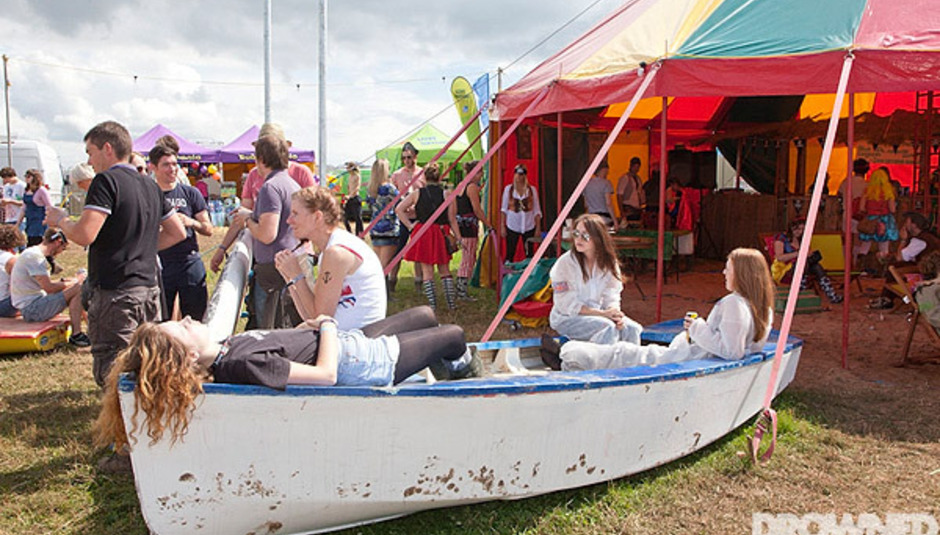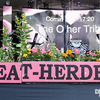With festival season in full flow it would seem that they are more popular than ever, with endless media updates painting Glastonbury as the place to be for anyone from Princes and Premiership footballers to the regular bearded hippies of old - and seemingly anyone within a whiff of a BBC salary too. I challenge anyone to walk down a British high street this summer without encountering a window display screaming “festival fashion”, featuring a mannequin stuffed into some garish wellies and a floral dress before a flimsy Argos tent. Yet despite all the mainstream coverage the reality is that the festival heyday is history, the boom in demand for tickets has since passed and the settling debris has left the market littered with more choice but hugely inflated prices. Just ask Vince Power, or alternatively cast at glance towards the trajectory for the share price of his imaginatively titled enterprise ‘Musical Festivals’ – from their trading debut in June 2011 until the suspension of trading in September 2012 the line graph seemed to depict Victoria Falls, instead of an experienced entrepreneur trawling a lucrative market. The ironically named Power pulled the plug on his Hop Farm venture a few months ago after five years of the Kent event, and concerns have also been raised about the future of Benicassim for which he just last week sold his majority stake in. He’s far from the only one devoid of problems though, with victims including No Direction Home, Sonisphere (allegedly returning in 2014), the ATP weekenders, Truck Festival (more of which later), plus plenty of first time festivals such as Isle of Man, and Suffolk's Big Tree failing to get off the ground.
To gain more of an insight into this uncertain business I met up with Simon Mawbey, part of a small team of organisers, who helped to slowly build Y-Not Festival in Derbyshire up to the point where they were able to win ‘Best Small Festival’ at last year’s Festival Awards. I wanted to hear their story and find out how they accomplished their successful progression within such a competitive industry, and how that led to them taking over the running of one their favourite festivals in Truck. My first question to Simon was confirm the beginnings of Y-Not Festival which sound like the kind of myth PRs often spin to build that all important credibility, but the festival did actually begin as a tiny party of sixth-formers and grew from there. “That’s pretty much what happened. Originally it was going to be in a mate’s garden, Ralph – who is now my colleague, as his parents were going away and we were going to have some local bands on and a bbq. His parents didn't go away but the plans were still in place so we had to move it down the road to a quarry. In the end a 100 people came and it was alright!” Surprisingly it seems clear that the intention was never actually there to set up a festival business, unlike a lot of organisers who have attempted to fill perceived “gaps” in the market – “We just had a good time and thought we’d try it again and see what happens. So we did and a few more people came, maybe about 300. That second one was the first Y-Not really, we were all still at school it was just a little party - getting together and having a good time.”
That first quarry gathering was back in 2005 before Facebook events and the festival boom when the comprehensive eFestivals web directory listed around 60 festivals; they now feature in excess of 600 events in Britain just this year. Eight years on and the same close-knit team of school friends have been responsible for turning their good time seeking spirit into an award winning 8,000 capacity sellout event. This year’s line-up features some of their biggest names yet with the likes of The Cribs, The Horrors, and Mystery Jets all headlining. However they also now find themselves in the more serious situation of picking their livelihood from within a volatile market, where a festival being dealt a bad hand from mother nature, or picking the wrong line-up just once could throw the whole longevity of the businesses into jeopardy. Michael Eavis has previously stated that when Jay-Z headlined Glastonbury in 2008 it nearly bankrupt, proving that no-one is ever safe.
On first glance a festival line-up is always judged by its headliners and Simon ponders “It can be tough at the top, and it's a tricky one. There are obviously only so many pools of bands big enough and suitable enough to go around.” Y-Not have been wise to steer clear from focusing purely on obvious headliners able to sell x amount of tickets, as well as the reformations that “usually come with a hefty price tag” and have instead opted to holistically curate a more expanded and considered festival. Although even booking the lower end of the bill can be a struggle as a result of the increasingly common exclusivity deals the large festivals strong arm their bookings into agreeing, which in turn stifle bands' opportunities to play and generate an income whilst they have that often small window of attention. “It is just part and parcel of what we do now, and we just have to adapt and be flexible. As things have become more competitive it has become more prevalent and extensive across a wider pool of acts over the bill. It can be incredibly frustrating, we pretty much know at the beginning of the year who we definitely won't be able to book but we just have to be flexible and we manage to get a great bill every year, even if we have to really sweat for it.” The process isn't helped by the fact that “Artists fees have been going only one way, and I don't see any signs of that altering” yet they have to balance how to manage the rising fees whilst being determined to keep the ticket price affordable to the younger fans who are finding themselves priced out of the market elsewhere. And in a never-ending cycle to better themselves, before they've even emerged from their comedown and dismantled the stages, there is no time to savour what they've done as the quest to the find next year’s headliners commences “Every year it seems to get a little earlier, as we have to - bands are tying up their summer and touring schedules. Certainly as the number of festivals has grown they've become much more integral to bands touring schedules. A lot of bands plan around festival season as a focal point. We’ve been to meetings in Sep/Oct with agents, and bands already have their next year wrapped up, so you have to be on the ball or you miss out.”
Further down the bill the team always had a desire to give opportunities to emerging bands, as well as challenge their audience often under appreciated artists. To further this cause they have worked closely with trusted labels Alcopop! and Big Scary Monsters, who were both invited to curate a stage this year. They've even given responsibly to a few of their more established bookings to pass the baton down, this saw The Horrors selecting 'Big Bad Wow' to play, and Mystery Jets inviting DiS favourites 'Dinghus Khan' (below) to open the main stage. Earlier on in the year when green fields and 8% ciders were hazy memories for most people, a lot of time was spent working to develop and perfect a transparent, free to use app to make it easier to listen to their fans' wishlists, and to make it easier for bands to apply. It's the kind of progression that will hopefully see the end of parasitic behaviour such as that of Sonicbids, with Simon explaining it as “I’ve never seen anything like it out there, I’ve seen similar things but nothing as accessible. We just wanted to create a free, fair, and completely open process for anyone, anywhere to apply and get your track on our facebook to our audience of 25,000 likes. So anyone can then listen to that track or request a band. So if there’s an undiscovered band you love, you could request to see them at the festival.” It resulted in 1800 band submissions, plus an even greater number of people discovering music new to them via a facebook app, plus 20 lucky bands being invited to play the festival.
Alongside the bands they’ve arranged a variety of other things to keep people occupied too - “We're really stepping up that side of things this year, we think that's really important. There’ll be a 1950s drive in cinema, cabaret, hundreds of workshop, funfair rides, Derbyshire Food Festival, a Real Ale & Cider Festival, comedy, and loads more planned.” They are also very aware that it’s the atmosphere of the festival is also at the crux of whether people will return in future year, with Simon enthusing “In my mind it's probably the most important element - you can have the best line-up in the world but if the festival is dry and stale it’s no good. I don't believe that you can stick a stage in a field and create a festival, and you do see it happen. It’s just not the way we’ve done it, and I think the real secret to that in our opinion is organic growth and people that grow with you, year upon year. A lot of people do come back and that's really important to us, you see people with all the wristbands on from 5/6 years ago, and that’s the key.” I can immediately think of recent examples where small independent gig promoters have decided to play fantasy festival, jumped in at the deep-end booking big bands and expected to sell 4,000 tickets. You just need to take a look at the social media reviews that follow to see how it turns out for such naively overly ambitious first events coping with an onslaught of teething problems - it rarely ends well, should it sell enough tickets to go ahead in the first place. It’s a simple equation where if there’s nothing for attendees to complain about then they are going to have a much better experience. With this in mind Y-Not have dedicated a lot of time and effort into getting the less glamorous side of the festival correct, winning awards for their toilets in 2011 (I wouldn't like to be the person judging that award!) - “That's something we are wanting to repeat this year, and we're also taking a huge step up on the family camping side of things and hopefully going to make it a really nice experience for anyone wanting to bring children along and treat it as a bit of a getaway.” They have also moved to abolish day tickets this year “For us we put together a weekend, not a Saturday night. We want people to come and enjoy the whole weekend instead of turning up and leaving again”. A move that is also likely to have positive benefits in terms of both security and a sense of onsite community.
Whilst there is a huge dog-eat-dog element to the festival industry, alliances are being formed and Y-Not have managed to form a healthy pact with Gloucestershire's 2000trees in which punters can buy a reduced joint ticket for both weekends “They're a really good bunch of guys, we've known them for a long time and they put on a great little festival, and the joint tickets allow us to offer customers two very different experiences.” I'm vigorously nodding in agreement by this point having happily attended 2000trees on several occasions, and whilst the two affectionately refer to each other as 'sister festivals' I see 2000trees as the brooding older brother with the extensive, darker record collection. I pushed Simon as to whether the relationship allows the two to be able to leverage any extra power over booking agents “It just means that we share a bit of advice and help each other where we can. There's not any additional power, but for some artists pulling together a summer schedule it can make the process that bit smoother when we can offer 2-3 dates and help to fill their summer.”
It seemed that I had inadvertently hit upon one of many motivations for the team wanting to step up and take onboard the bankrupted Truck Festival, which now reborn shares several crossover bands with Y-Not such as Ash and The Horrors, and naturally I was intrigued to find out how such a development had occurred “We’ve been aware of Truck, as obviously I’m sure a lot of others have, for some time. It’s kind of pretty much laid the blueprint for smaller festivals. I think it’s been touted in the press as 'the godfather of the small festival' and that's definitely how we saw it. We knew they’d had a bit of trouble for one reason or another, as a lot of small festivals have. We bumped into them at the Festival Awards and we basically had a meeting soon after to see if we could help out”. The outcome being that several months down the line Simon and his colleagues were in full control and working on rebuilding Truck to its former glories “taking the elements that were loved and wrapping it up into a new package”, with a keenness to respect the fact Truck has a 15 year-old history and legacy. One such move was to bring back The Barn stage, which they found to be a popular choice, and filling it with exciting live bands such as Rolo Tommassi, Bo Ningen, and Tall Ships. Simon described it as “being a learning curve getting onboard at that stage in a festival’s lifetime having built Y-Not from the ground-up” but from his enthusiasm in discussing the festival he is obviously enjoying the experience and challenge it brings.
Several people have cited Truck's possible past failures as a result of an over eagerness to expand. I therefore ask Simon if Y-Not, which currently sees itself in a similar position, will continue its expansion “We're sticking at 8,000 with no plans to increase this year. We can retain the intimate atmosphere that people really like, but still be big enough to feel like a music festival. It also means that people feel that their money has gone to something.” He later adds that the biggest challenge in their history has come from needing to progress whilst maintaining what they are about, which leads me to pose the issue of sponsorship which blights many of the major festivals “It's really important to us to maintain our integrity, and there's one train of thought to this and if it benefits the festival go-er and enhances their experiences and makes the festival better, than that's ok. We wouldn't just sell the Y-Not name for a cheque. However not all sponsorship is bad, there's things you can do that can really enhance the experience, but it's got to be right basically.”
With all that business talk exhausted, we switched the conversation to the real purpose of all the above and I asked Simon who his must see pick for anyone attending Y-Not would be “I'm really hoping to grab a few minutes to catch Wet Nuns, a couple of guys from Sheffield who make dark, punky, blues-rock. It's nice to hear someone using guitars to make lots of noise.”
If I were to make my own suggestion, a DiS pick as it were, I'd recommend catching the return of Sky Larkin, with Katie Harkin now back to frontwoman duties after a lengthy period roaming the road as a Wild Beast. The band have now grown to a formidable four piece since their last album, retaining their nimble melodic rock whilst adding all the more power to their deft punches.
Whilst the original Truck Festival may have helped craft the blueprint, Y-Not’s small team have been working hard for a long time to cement the foundations, and it will hopefully see them and their events withstand this period of consolidation. As there are undoubtedly going to be more casualties as the dryer festivals are purged (blaming the economy as they quietly exit stage right) but with any luck it will leave the festival go-er with a better choice of higher quality small festival when summer rolls round.
Y-Not Festival takes place between 2nd and 4th August at Pikehall, Derbyshire. Weekend tickets cost £79.50. http://ynotfestivals.co.uk






















